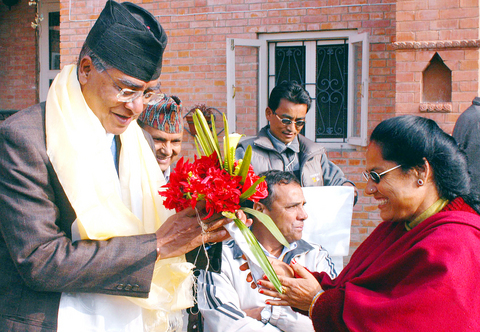Nepal's ousted premier was released from prison early yesterday, hours after the Supreme Court dissolved the royal anti-corruption body that jailed him, striking a blow against King Gyanendra's absolute rule.
Sher Bahadur Deuba was jailed for two years last July by a body established after the king sacked him as prime minister, kicked out his government and assumed total control on Feb. 1 last year.
Former minister for physical planning and works Prakash Man Singh, jailed for corruption at the same time as Deuba, was also freed, the local media reported.

PHOTO: AP
"I am very happy to have been released," Deuba told journalists waiting outside his home yesterday morning.
"The court's decision is good, and my release is a democratic step," he said.
Deuba said he would hold a press conference later in the day.
The Royal Commission for Cor-ruption Control was dissolved by the country's Supreme Court on Monday, when the country's top judges ruled that the establishment and operations of the body were unconstitutional.
The much-criticized commission against corruption was set up soon after Gyanendra assumed total control of the Himalayan kingdom.
Gyanendra said the takeover was necessary because the government was corrupt and had failed to tackle a 10-year Maoist insurgency.
Senior lawyer and former president of the Nepal Bar Association Sindhunath Pyakurel hailed the Supreme Court's decision, saying it had "established the supremacy of the Constitution and law in the country."
"It has given the message that the king must perform his duty and remain within the constitutional framework. He cannot stay on as chairman of the council of ministers," Pyakurel said.
"The verdict has given the indirect message to the king to correct his Feb. 1 move, which is against the spirit of the Constitution," he said.
Deuba, president of the Nepali Congress when he was jailed, had consistently said he was framed by the royal body, which also fined him US$1.26 million.
The alleged corruption related to the granting of a contract in a road building scheme that formed part of a US$464 million project to supply drinking water to the capital.
The Supreme Court ruling could pave the way for legal challenges of all decisions made by Gyanendra over the past year of his direct control, the Himalayan Times said in an editorial.
"The verdict has also set a precedent that any action of the monarch is subject to a test of constitutionality in the Supreme Court," the paper said.
"Some may interpret it as a political setback for the regime, while others may see in it a political thaw," it added.
The decision by the Supreme Court was a direct challenge to Nepal's beleaguered king, political analyst S.M. Habibullah said.
"It's a good sign because the judiciary has taken a step against the unconstitutional steps of the king. Because the king's power has been limited, this shows real rule of law," said Habibullah, head of political science at Tribhuvan university.
The six-member anti-corruption body was set up using emergency provisions of the Constitution, the news Web site Kantipur said.
Although the state of emergency imposed by Gyanendra was lifted in April, the commission was allowed to continue under a royal decree, the news portal reported.

A feud has broken out between the top leaders of the far-right Alternative for Germany (AfD) party on whether to maintain close ties with Russia. The AfD leader Alice Weidel this week slammed planned visits to Russia by some party lawmakers, while coleader Tino Chrupalla voiced a defense of Russian President Vladimir Putin. The unusual split comes at a time when mainstream politicians have accused the anti-immigration AfD of acting as stooges for the Kremlin and even spying for Russia. The row has also erupted in a year in which the AfD is flying high, often polling above the record 20 percent it

Ecuadorans are today to vote on whether to allow the return of foreign military bases and the drafting of a new constitution that could give the country’s president more power. Voters are to decide on the presence of foreign military bases, which have been banned on Ecuadoran soil since 2008. A “yes” vote would likely bring the return of the US military to the Manta air base on the Pacific coast — once a hub for US anti-drug operations. Other questions concern ending public funding for political parties, reducing the number of lawmakers and creating an elected body that would

The latest batch from convicted sex offender Jeffrey Epstein’s e-mails illustrates the extraordinary scope of his contacts with powerful people, ranging from a top Trump adviser to Britain’s ex-prince Andrew. The US House of Representatives is expected to vote this week on trying to force release of evidence gathered on Epstein by law enforcement over the years — including the identities of the men suspected of participating in his alleged sex trafficking ring. However, a slew of e-mails released this week have already opened new windows to the extent of Epstein’s network. These include multiple references to US President Donald

CHARGES: The former president, who maintains his innocence, was sentenced to 27 years and three months in prison for a failed coup bid, as well as an assassination plot Far-right former Brazilian president Jair Bolsonaro is running out of options to avoid prison, after judges on Friday rejected his appeal against a 27-year sentence for a botched coup bid. Bolsonaro lost the 2022 elections and was convicted in September for his efforts to prevent Brazlian President Luiz Inacio Lula da Silva from taking power after the polls. Prosecutors said the scheme — which included plans to assassinate Lula and a top Brazilian Supreme Court judge — failed only due to a lack of support from military top brass. A panel of Supreme Court judges weighing Bolsonaro’s appeal all voted to uphold